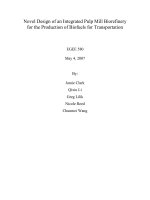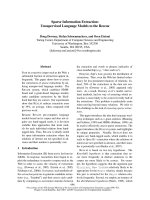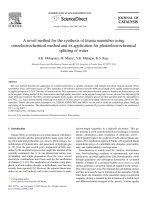the novel the rescue
Bạn đang xem bản rút gọn của tài liệu. Xem và tải ngay bản đầy đủ của tài liệu tại đây (1.3 MB, 309 trang )
TheProjectGutenbergEBookofTheRescue,byJosephConrad
ThiseBookisfortheuseofanyoneanywhereatnocostandwith
almostnorestrictionswhatsoever.Youmaycopyit,giveitawayor
re-useitunderthetermsoftheProjectGutenbergLicenseincluded
withthiseBookoronlineatwww.gutenberg.org
Title:TheRescue
Author:JosephConrad
ReleaseDate:January9,2006[EBook#1712]
LastUpdated:March2,2018
Language:English
***STARTOFTHISPROJECTGUTENBERGEBOOKTHERESCUE***
ProducedbyJudyBossandDavidWidger
THERESCUE
AROMANCEOFTHESHALLOWS
ByJosephConrad
'Allas!'quodshe,'thateverthissholdehappe!
ForwendeInever,bypossibilitee,Thatswicha
monstre or merveille mighte be!' —THE
FRANKELEYN'STALE
TO FREDERIC COURTLAND PENFIELD
LAST AMBASSADOR OF THE UNITED
STATES OF AMERICA TO THE LATE
AUSTRIANEMPIRE,THISOLDTIMETALE
IS GRATEFULLY INSCRIBED IN MEMORY
OF THE RESCUE OF CERTAIN
DISTRESSEDTRAVELLERSEFFECTEDBY
HIM IN THE WORLD'S GREAT STORM OF
THEYEAR1914
Contents
AUTHOR'SNOTE
PARTI. THEMANANDTHEBRIG
PARTII. THESHOREOFREFUGE
PARTIII. THECAPTURE
PARTIV. THEGIFTOFTHESHALLOWS
PARTV. THEPOINTOFHONOURANDTHEPOINTOFPASSION
PARTVI. THECLAIMOFLIFEANDTHETOLLOFDEATH
AUTHOR'SNOTE
Ofthethreelongnovelsofminewhichsufferedaninterruption,“TheRescue”
wastheonethathadtowaitthelongestforthegoodpleasureoftheFates.Iam
betraying no secret when I state here that it had to wait precisely for twenty
years.Ilaiditasideattheendofthesummerof1898anditwasabouttheendof
thesummerof1918thatItookitupagainwiththefirmdeterminationtoseethe
endofitandhelpedbythesuddenfeelingthatImightbeequaltothetask.
This does not mean that I turned to it with elation. I was well aware and
perhaps even too much aware of the dangers of such an adventure. The
amazingly sympathetic kindness which men of various temperaments, diverse
views and different literary tastes have been for years displaying towards my
workhasdonemuchforme,hasdoneall—exceptgivingmethatover-weening
self-confidence which may assist an adventurer sometimes but in the long run
endsbyleadinghimtothegallows.
AsthecharacteristicIwantmosttoimpressupontheseshortAuthor'sNotes
preparedformyfirstCollectedEditionisthatofabsolutefrankness,Ihastento
declarethatIfoundedmyhopesnotonmysupposedmeritsbutonthecontinued
goodwillofmyreaders.Imaysayatoncethatmyhopeshavebeenjustifiedout
ofallproportiontomydeserts.Imetwiththemostconsiderate,mostdelicately
expressedcriticismfreefromallantagonismandinitsconclusionsshowingan
insightwhichinitselfcouldnotfailtomovemedeeply,butwasassociatedalso
withenoughcommendationtomakemefeelrichbeyondthedreamsofavarice
—I mean an artist's avarice which seeks its treasure in the hearts of men and
women.
No! Whatever the preliminary anxieties might have been this adventure was
nottoendinsorrow.OncemoreFortunefavouredaudacity;andyetIhavenever
forgotten the jocular translation of Audacesfortunajuvat offered to me by my
tutorwhenIwasasmallboy:“TheAudaciousgetbitten.”Howeverhetookcare
tomentionthattherewerevariouskindsofaudacity.Oh,thereare,thereare!...
There is, for instance, the kind of audacity almost indistinguishable from
impudence....ImustbelievethatinthiscaseIhavenotbeenimpudentforIam
notconsciousofhavingbeenbitten.
The truth is that when “The Rescue” was laid aside it was not laid aside in
despair.Severalreasonscontributedtothisabandonmentand,nodoubt,thefirst
of them was the growing sense of general difficulty in the handling of the
subject.ThecontentsandthecourseofthestoryIhadclearlyinmymind.Butas
to the way of presenting the facts, and perhaps in a certain measure as to the
nature of the facts themselves, I had many doubts. I mean the telling,
representativefacts,helpfultocarryontheidea,and,atthesametime,ofsucha
natureasnottodemandanelaboratecreationoftheatmospheretothedetriment
of the action. I did not see how I could avoid becoming wearisome in the
presentation of detail and in the pursuit of clearness. I saw the action plainly
enough.WhatIhadlostforthemomentwasthesenseoftheproperformulaof
expression, the only formula that would suit. This, of course, weakened my
confidenceintheintrinsicworthandinthepossibleinterestofthestory—thatis
inmyinvention.ButIsuspectthatallthetroublewas,inreality,thedoubtofmy
prose,thedoubtofitsadequacy,ofitspowertomasterboththecoloursandthe
shades.
It is difficult to describe, exactly as I remember it, the complex state of my
feelings;butthoseofmyreaderswhotakeaninterestinartisticperplexitieswill
understand me best when I point out that I dropped “The Rescue” not to give
myself up to idleness, regrets, or dreaming, but to begin “The Nigger of the
'Narcissus'” and to go on with it without hesitation and without a pause. A
comparison of any page of “The Rescue” with any page of “The Nigger” will
furnish an ocular demonstration of the nature and the inward meaning of this
firstcrisisofmywritinglife.Foritwasacrisisundoubtedly.Thelayingasideof
aworksofaradvancedwasaveryawfuldecisiontotake.Itwaswrungfromme
byasuddenconvictionthatthereonlywastheroadofsalvation,theclearway
out for an uneasy conscience. The finishing of “The Nigger” brought to my
troubled mind the comforting sense of an accomplished task, and the first
consciousness of a certain sort of mastery which could accomplish something
with the aid of propitious stars. Why I did not return to “The Rescue” at once
then, was not for the reason that I had grown afraid of it. Being able now to
assumeafirmattitudeIsaidtomyselfdeliberately:“Thatthingcanwait.”Atthe
same time I was just as certain in my mind that “Youth,” a story which I had
then,sotospeak,onthetipofmypen,couldnotwait.Neithercould“Heartof
Darkness”beputoff;forthepracticalreasonthatMr.Wm.Blackwoodhaving
requestedmetowritesomethingfortheNo.MofhismagazineIhadtostirupat
once the subject of that tale which had been long lying quiescent in my mind,
because,obviously,thevenerableMagaatherpatriarchalageof1000numbers
couldnotbekeptwaiting.Then“LordJim,”withaboutseventeenpagesalready
writtenatoddtimes,putinhisclaimwhichwasirresistible.Thuseverystrokeof
thepenwastakingmefurtherawayfromtheabandoned“Rescue,”notwithout
somecompunctiononmypartbutwithagraduallydiminishingresistance;tillat
last I let myself go as if recognising a superior influence against which it was
uselesstocontend.
The years passed and the pages grew in number, and the long reveries of
which they were the outcome stretched wide between me and the deserted
“Rescue”likethesmoothhazyspacesofadreamysea.YetIneveractuallylost
sight of that dark speck in the misty distance. It had grown very small but it
asserteditselfwiththeappealofoldassociations.Itseemedtomethatitwould
be a base thing for me to slip out of the world leaving it out there all alone,
waitingforitsfate—thatwouldnevercome?
Sentiment,puresentimentasyousee,promptedmeinthelastinstancetoface
thepainsandhazardsofthatreturn.AsImovedslowlytowardstheabandoned
body of the tale it loomed up big amongst the glittering shallows of the coast,
lonelybutnotforbidding.Therewasnothingaboutitofagrimderelict.Ithadan
airofexpectantlife.OneafteranotherImadeoutthefamiliarfaceswatchingmy
approachwithfaintsmilesofamusedrecognition.Theyhadknownwellenough
thatIwasboundtocomebacktothem.Buttheireyesmetmineseriouslyaswas
only to be expected since I, myself, felt very serious as I stood amongst them
againafteryearsofabsence.Atonce,withoutwastingwords,wewenttowork
togetheronourrenewedlife;andeverymomentIfeltmorestronglythatThey
WhohadWaitedborenogrudgetothemanwhohoweverwidelyhemayhave
wanderedattimeshadplayedtruantonlyonceinhislife.
1920.J.C.
PARTI.THEMANANDTHEBRIG
The shallow sea that foams and murmurs on the shores of the thousand
islands, big and little, which make up the Malay Archipelago has been for
centuries the scene of adventurous undertakings. The vices and the virtues of
fournationshavebeendisplayedintheconquestofthatregionthateventothis
dayhasnotbeenrobbedofallthemysteryandromanceofitspast—andtherace
ofmenwhohadfoughtagainstthePortuguese,theSpaniards,theDutchandthe
English,hasnotbeenchangedbytheunavoidabledefeat.Theyhavekepttothis
day their love of liberty, their fanatical devotion to their chiefs, their blind
fidelity in friendship and hate—all their lawful and unlawful instincts. Their
countryoflandandwater—fortheseawasasmuchtheircountryastheearthof
their islands—has fallen a prey to the western race—the reward of superior
strength if not of superior virtue. To-morrow the advancing civilization will
obliterate the marks of a long struggle in the accomplishment of its inevitable
victory.
Theadventurerswhobeganthatstrugglehaveleftnodescendants.Theideas
oftheworldchangedtooquicklyforthat.Butevenfarintothepresentcentury
theyhavehadsuccessors.Almostinourowndaywehaveseenoneofthem—a
trueadventurerinhisdevotiontohisimpulse—amanofhighmindandofpure
heart,laythefoundationofaflourishingstateontheideasofpityandjustice.He
recognized chivalrously the claims of the conquered; he was a disinterested
adventurer,andtherewardofhisnobleinstinctsisinthevenerationwithwhich
astrangeandfaithfulracecherishhismemory.
Misunderstood and traduced in life, the glory of his achievement has
vindicatedthepurityofhismotives.Hebelongstohistory.Buttherewereothers
—obscure adventurers who had not his advantages of birth, position, and
intelligence; who had only his sympathy with the people of forests and sea he
understood and loved so well. They can not be said to be forgotten since they
have not been known at all. They were lost in the common crowd of seamentradersoftheArchipelago,andiftheyemergedfromtheirobscurityitwasonly
tobecondemnedaslaw-breakers.Theirliveswerethrownawayforacausethat
had no right to exist in the face of an irresistible and orderly progress—their
thoughtlesslivesguidedbyasimplefeeling.
But the wasted lives, for the few who know, have tinged with romance the
region of shallow waters and forest-clad islands, that lies far east, and still
mysteriousbetweenthedeepwatersoftwooceans.
I
Out of the level blue of a shallow sea Carimata raises a lofty barrenness of
grey and yellow tints, the drab eminence of its arid heights. Separated by a
narrowstripofwater,Suroeton,tothewest,showsacurvedandridgedoutline
resembling the backbone of a stooping giant. And to the eastward a troop of
insignificantisletsstandeffaced,indistinct,withvaguefeaturesthatseemtomelt
intothegatheringshadows.Thenightfollowingfromtheeastwardtheretreatof
the setting sun advanced slowly, swallowing the land and the sea; the land
broken,tormentedandabrupt;theseasmoothandinvitingwithitseasypolishof
continuoussurfacetowanderingsfacileandendless.
Therewasnowind,andasmallbrigthathadlainalltheafternoonafewmiles
tothenorthwardandwestwardofCarimatahadhardlyaltereditspositionhalfa
mile during all these hours. The calm was absolute, a dead, flat calm, the
stillnessofadeadseaandofadeadatmosphere.Asfarastheeyecouldreach
therewasnothingbutanimpressiveimmobility.Nothingmovedonearth,onthe
waters, and above them in the unbroken lustre of the sky. On the unruffled
surfaceofthestraitsthebrigfloatedtranquilanduprightasifboltedsolidly,keel
tokeel,withitsownimagereflectedintheunframedandimmensemirrorofthe
sea. To the south and east the double islands watched silently the double ship
that seemed fixed amongst them forever, a hopeless captive of the calm, a
helplessprisoneroftheshallowsea.
Sincemidday,whenthelightandcapriciousairsoftheseseashadabandoned
the little brig to its lingering fate, her head had swung slowly to the westward
andtheendofherslenderandpolishedjib-boom,projectingboldlybeyondthe
gracefulcurveofthebow,pointedatthesettingsun,likeaspearpoisedhighin
thehandofanenemy.RightaftbythewheeltheMalayquartermasterstoodwith
hisbare,brownfeetfirmlyplantedonthewheel-grating,andholdingthespokes
at right angles, in a solid grasp, as though the ship had been running before a
gale. He stood there perfectly motionless, as if petrified but ready to tend the
helmassoonasfatewouldpermitthebrigtogatherwaythroughtheoilysea.
Theonlyotherhumanbeingthenvisibleonthebrig'sdeckwasthepersonin
charge: a white man of low stature, thick-set, with shaven cheeks, a grizzled
moustache,andafacetintedascarlethuebytheburningsunsandbythesharp
saltbreezesoftheseas.Hehadthrownoffhislightjacket,andcladonlyinwhite
trousers and a thin cotton singlet, with his stout arms crossed on his breast—
uponwhichtheyshowedliketwothicklumpsofrawflesh—heprowledabout
from side to side of the half-poop. On his bare feet he wore a pair of straw
sandals, and his head was protected by an enormous pith hat—once white but
nowverydirty—whichgavetothewholemantheaspectofaphenomenaland
animatedmushroom.Attimeshewouldinterrupthisuneasyshuffleathwartthe
breakofthepoop,andstandmotionlesswithavaguegazefixedontheimageof
the brig in the calm water. He could also see down there his own head and
shouldersleaningoutovertherailandhewouldstandlong,asifinterestedby
hisownfeatures,andmuttervaguecursesonthecalmwhichlayupontheship
likeanimmovableburden,immenseandburning.
Atlast,hesighedprofoundly,nervedhimselfforagreateffort,andmakinga
startawayfromtherailmanagedtodraghisslippersasfarasthebinnacle.There
hestoppedagain,exhaustedandbored.Fromundertheliftedglasspanesofthe
cabinskylightnearbycamethefeeblechirpofacanary,whichappearedtogive
him some satisfaction. He listened, smiled faintly muttered “Dicky, poor Dick
—” and fell back into the immense silence of the world. His eyes closed, his
headhunglowoverthehotbrassofthebinnacletop.Suddenlyhestoodupwith
ajerkandsaidsharplyinahoarsevoice:
“You'vebeensleeping—you.Shiftthehelm.Shehasgotsternwayonher.”
The Malay, without the least flinch of feature or pose, as if he had been an
inanimateobjectcalledsuddenlyintolifebysomehiddenmagicofthewords,
spunthewheelrapidly,lettingthespokespassthroughhishands;andwhenthe
motionhadstoppedwithagrindingnoise,caughtholdagainandheldongrimly.
Afterawhile,however,heturnedhisheadslowlyoverhisshoulder,glancedat
thesea,andsaidinanobstinatetone:
“Nocatchwind—nogetway.”
“No catch—no catch—that's all you know about it,” growled the red-faced
seaman.“ByandbycatchAli—”hewentonwithsuddencondescension.“By
andbycatch,andthenthehelmwillbetherightway.See?”
Thestolidseacannieappearedtosee,andforthatmattertohear,nothing.The
whitemanlookedattheimpassiveMalaywithdisgust,thenglancedaroundthe
horizon—thenagainatthehelmsmanandorderedcurtly:
“Shift the helm back again. Don't you feel the air from aft? You are like a
dummystandingthere.”
TheMalayrevolvedthespokesagainwithdisdainfulobedience,andtheredfaced man was moving forward grunting to himself, when through the open
skylight the hail “On deck there!” arrested him short, attentive, and with a
suddenchangetoamiabilityintheexpressionofhisface.
“Yes,sir,”hesaid,bendinghiseartowardtheopening.“What'sthematterup
there?”askedadeepvoicefrombelow.
Thered-facedmaninatoneofsurprisesaid:
“Sir?”
“I hear that rudder grinding hard up and hard down. What are you up to,
Shaw?Anywind?”
“Ye-es,”drawledShaw,puttinghisheaddowntheskylightandspeakinginto
thegloomofthecabin.“Ithoughttherewasalightair,and—butit'sgonenow.
Notabreathanywhereundertheheavens.”
Hewithdrewhisheadandwaitedawhilebytheskylight,butheardonlythe
chirping of the indefatigable canary, a feeble twittering that seemed to ooze
through the drooping red blossoms of geraniums growing in flower-pots under
the glass panes. He strolled away a step or two before the voice from down
belowcalledhurriedly:
“Hey,Shaw?Areyouthere?”
“Yes, Captain Lingard,” he answered, stepping back. “Have we drifted
anythingthisafternoon?”
“Notaninch,sir,notaninch.Wemightaswellhavebeenatanchor.”
“It'salwaysso,”saidtheinvisibleLingard.Hisvoicechangeditstoneashe
movedinthecabin,anddirectlyafterwardburstoutwithaclearintonationwhile
hisheadappearedabovetheslideofthecabinentrance:
“Always so! The currents don't begin till it's dark, when a man can't see
against what confounded thing he is being drifted, and then the breeze will
come.Deadonend,too,Idon'tdoubt.”
Shaw moved his shoulders slightly. The Malay at the wheel, after making a
divetoseethetimebythecabinclockthroughtheskylight,rangadoublestroke
onthesmallbellaft.Directlyforward,onthemaindeck,ashrillwhistlearose
longdrawn,modulated,dyingawaysoftly.Themasterofthebrigsteppedoutof
thecompanionuponthedeckofhisvessel,glancedaloftattheyardslaiddead
square;then,fromthedoor-step,tookalong,lingeringlookroundthehorizon.
Hewasaboutthirty-five,erectandsupple.Hemovedfreely,morelikeaman
accustomed to stride over plains and hills, than like one who from his earliest
youthhadbeenusedtocounteractbysuddenswayingsofhisbodytheriseand
roll of cramped decks of small craft, tossed by the caprice of angry or playful
seas.
Heworeagreyflannelshirt,andhiswhitetrouserswereheldbyabluesilk
scarfwoundtightlyroundhisnarrowwaist.Hehadcomeuponlyforamoment,
but finding the poop shaded by the main-topsail he remained on deck
bareheaded.Thelightchestnuthaircurledcloseabouthiswell-shapedhead,and
the clipped beard glinted vividly when he passed across a narrow strip of
sunlight, as if every hair in it had been a wavy and attenuated gold wire. His
mouth was lost in the heavy moustache; his nose was straight, short, slightly
bluntedattheend;abroadbandofdeeperredstretchedundertheeyes,clungto
the cheek bones. The eyes gave the face its remarkable expression. The
eyebrows, darker than the hair, pencilled a straight line below the wide and
unwrinkled brow much whiter than the sunburnt face. The eyes, as if glowing
with the light of a hidden fire, had a red glint in their greyness that gave a
scrutinizingardourtothesteadinessoftheirgaze.
Thatman,oncesowellknown,andnowsocompletelyforgottenamongstthe
charming and heartless shores of the shallow sea, had amongst his fellows the
nickname of “Red-Eyed Tom.” He was proud of his luck but not of his good
sense.Hewasproudofhisbrig,ofthespeedofhiscraft,whichwasreckoned
theswiftestcountryvesselinthoseseas,andproudofwhatsherepresented.
She represented a run of luck on the Victorian goldfields; his sagacious
moderation;longdaysofplanning,oflovingcareinbuilding;thegreatjoyofhis
youth, the incomparable freedom of the seas; a perfect because a wandering
home;hisindependence,hislove—andhisanxiety.Hehadoftenheardmensay
thatTomLingardcaredfornothingonearthbutforhisbrig—andinhisthoughts
he would smilingly correct the statement by adding that he cared for nothing
livingbutthebrig.
To him she was as full of life as the great world. He felt her live in every
motion,ineveryroll,ineveryswayofhertaperingmasts,ofthosemastswhose
paintedtrucksmoveforever,toaseaman'seye,againstthecloudsoragainstthe
stars.Tohimshewasalwaysprecious—likeoldlove;alwaysdesirable—likea
strange woman; always tender—like a mother; always faithful—like the
favouritedaughterofaman'sheart.
Forhourshewouldstandelbowonrail,hisheadinhishandandlisten—and
listenindreamystillnesstothecajolingandpromisingwhisperofthesea,that
slipped past in vanishing bubbles along the smooth black-painted sides of his
craft.Whatpassedinsuchmomentsofthoughtfulsolitudethroughthemindof
thatchildofgenerationsoffishermenfromthecoastofDevon,wholikemostof
hisclasswasdeadtothesubtlevoices,andblindtothemysteriousaspectsofthe
world—themanreadyfortheobvious,nomatterhowstartling,howterribleor
menacing, yet defenceless as a child before the shadowy impulses of his own
heart;whatcouldhavebeenthethoughtsofsuchaman,whenoncesurrendered
toadreamymood,itisdifficulttosay.
No doubt he, like most of us, would be uplifted at times by the awakened
lyrismofhisheartintoregionscharming,empty,anddangerous.Butalso,like
mostofus,hewasunawareofhisbarrenjourneysabovetheinterestingcaresof
thisearth.Yetfromthese,nodoubtabsurdandwastedmoments,thereremained
on the man's daily life a tinge as that of a glowing and serene half-light. It
softened the outlines of his rugged nature; and these moments kept close the
bondbetweenhimandhisbrig.
He was aware that his little vessel could give him something not to be had
from anybody or anything in the world; something specially his own. The
dependenceofthatsolidmanofboneandmuscleonthatobedientthingofwood
and iron, acquired from that feeling the mysterious dignity of love. She—the
craft—hadallthequalitiesofalivingthing:speed,obedience,trustworthiness,
endurance,beauty,capacitytodoandtosuffer—allbutlife.He—theman—was
theinspirerofthatthingthattohimseemedthemostperfectofitskind.Hiswill
was its will, his thought was its impulse, his breath was the breath of its
existence.Hefeltallthisconfusedly,withoutevershapingthisfeelingintothe
soundless formulas of thought. To him she was unique and dear, this brig of
threehundredandfourteentonsregister—akingdom!
And now, bareheaded and burly, he walked the deck of his kingdom with a
regular stride. He stepped out from the hip, swinging his arms with the free
motion of a man starting out for a fifteen-mile walk into open country; yet at
everytwelfthstridehehadtoturnaboutsharplyandpacebackthedistanceto
thetaffrail.
Shaw, with his hands stuck in his waistband, had hooked himself with both
elbowstotherail,andgazedapparentlyatthedeckbetweenhisfeet.Inreality
he was contemplating a little house with a tiny front garden, lost in a maze of
riversidestreetsintheeastendofLondon.Thecircumstancethathehadnot,as
yet,beenabletomaketheacquaintanceofhisson—nowagedeighteenmonths
—worried him slightly, and was the cause of that flight of his fancy into the
murky atmosphere of his home. But it was a placid flight followed by a quick
return. In less than two minutes he was back in the brig. “All there,” as his
sayingwas.Hewasproudofbeingalways“allthere.”
He was abrupt in manner and grumpy in speech with the seamen. To his
successivecaptains,hewasoutwardlyasdeferentialasheknewhow,andasa
rule inwardly hostile—so very few seemed to him of the “all there” kind. Of
Lingard,withwhomhehadonlybeenashorttime—havingbeenpickedupin
MadrasRoadsoutofahomeship,whichhehadtoleaveafterathumpingrow
withthemaster—hegenerallyapproved,althoughherecognizedwithregretthat
thisman,likemostothers,hadsomeabsurdfads;hedefinedthemas“bottomupwardsnotions.”
He was a man—as there were many—of no particular value to anybody but
himself,andofnoaccountbutasthechiefmateofthebrig,andtheonlywhite
manonboardofherbesidesthecaptain.Hefelthimselfimmeasurablysuperior
to the Malay seamen whom he had to handle, and treated them with lofty
toleration, notwithstanding his opinion that at a pinch those chaps would be
foundemphatically“notthere.”
As soon as his mind came back from his home leave, he detached himself
from the rail and, walking forward, stood by the break of the poop, looking
along the port side of the main deck. Lingard on his own side stopped in his
walkandalsogazedabsentmindedlybeforehim.Inthewaistofthebrig,inthe
narrowsparsthatwerelashedoneachsideofthehatchway,hecouldseeagroup
ofmensquattinginacirclearoundawoodentraypiledupwithrice,whichstood
onthejustsweptdeck.Thedark-faced,soft-eyedsilentmen,squattingontheir
hams,feddecorouslywithanearnestnessthatdidnotexcludereserve.
Of the lot, only one or two wore sarongs, the others having submitted—at
least at sea—to the indignity of European trousers. Only two sat on the spars.
One,amanwithachildlike,lightyellowface, smilingwithfatuousimbecility
underthewispsofstraightcoarsehairdyedamahoganytint,wasthetindalof
thecrew—akindofboatswain'sorserang'smate.Theother,sittingbesidehim
on the booms, was a man nearly black, not much bigger than a large ape, and
wearing on his wrinkled face that look of comical truculence which is often
characteristicofmenfromthesouthwesterncoastofSumatra.
This was the kassab or store-keeper, the holder of a position of dignity and
ease. The kassab was the only one of the crew taking their evening meal who
noticedthepresenceondeckoftheircommander.Hemutteredsomethingtothe
tindal who directly cocked his old hat on one side, which senseless action
investedhimwithanaltogetherfoolishappearance.Theothersheard,butwent
onsomnolentlyfeedingwithspiderymovementsoftheirleanarms.
The sun was no more than a degree or so above the horizon, and from the
heatedsurfaceofthewatersaslightlowmistbegantorise;amistthin,invisible
tothehumaneye;yetstrongenoughtochangethesunintoamereglowingred
disc,adiscverticalandhot,rollingdowntotheedgeofthehorizontalandcoldlookingdiscoftheshiningsea.Thentheedgestouchedandthecircularexpanse
ofwatertookonsuddenlyatint,sombre,likeafrown;deep,likethebrooding
meditationofevil.
The falling sun seemed to be arrested for a moment in his descent by the
sleeping waters, while from it, to the motionless brig, shot out on the polished
anddarksurfaceoftheseaatrackoflight,straightandshining,resplendentand
direct;apathofgoldandcrimsonandpurple,apaththatseemedtoleaddazzling
andterriblefromtheearthstraightintoheaventhroughtheportalsofaglorious
death.Itfadedslowly.Theseavanquishedthelight.Atlastonlyavestigeofthe
sunremained,faroff,likearedsparkfloatingonthewater.Itlingered,andallat
once—withoutwarning—wentoutasifextinguishedbyatreacheroushand.
“Gone,”criedLingard,whohadwatchedintentlyyetmissedthelastmoment.
“Gone!Lookatthecabinclock,Shaw!”
“Nearlyright,Ithink,sir.Threeminutespastsix.”
Thehelmsmanstruckfourbellssharply.Anotherbarefootedseacannieglided
onthefarsideofthepooptorelievethewheel,andtheserangofthebrigcame
uptheladdertotakechargeofthedeckfromShaw.Hecameuptothecompass,
andstoodwaitingsilently.
“The course is south by east when you get the wind, serang,” said Shaw,
distinctly.
“Sou'byeas',”repeatedtheelderlyMalaywithgraveearnestness.
“Letmeknowwhenshebeginstosteer,”addedLingard.
“Ya,Tuan,”answeredtheman,glancingrapidlyatthesky.“Windcoming,”he
muttered.
“Ithinkso,too,”whisperedLingardasiftohimself.
The shadows were gathering rapidly round the brig. A mulatto put his head
outofthecompanionandcalledout:
“Ready,sir.”
“Let's get a mouthful of something to eat, Shaw,” said Lingard. “I say, just
take a look around before coming below. It will be dark when we come up
again.”
“Certainly, sir,” said Shaw, taking up a long glass and putting it to his eyes.
“Blessedthing,”hewentoninsnatcheswhileheworkedthetubesinandout,“I
can't—neversomehow—Ah!I'vegotitrightatlast!”
Herevolvedslowlyonhisheels,keepingtheendofthetubeonthesky-line.
Thenheshuttheinstrumentwithaclick,andsaiddecisively:
“Nothinginsight,sir.”
Hefollowedhiscaptaindownbelowrubbinghishandscheerfully.
For a good while there was no sound on the poop of the brig. Then the
seacannieatthewheelspokedreamily:
“Didthemalimsaytherewasnooneonthesea?”
“Yes,”gruntedtheserangwithoutlookingatthemanbehindhim.
“Betweentheislandstherewasaboat,”pronouncedthemanverysoftly.
The serang, his hands behind his back, his feet slightly apart, stood very
straightandstiffbythesideofthecompassstand.Hisface,nowhardlyvisible,
wasasinexpressiveasthedoorofasafe.
“Now,listentome,”insistedthehelmsmaninagentletone.
Themaninauthoritydidnotbudgeahair'sbreadth.Theseacanniebentdown
alittlefromtheheightofthewheelgrating.
“Isawaboat,”hemurmuredwithsomethingofthetenderobstinacyofalover
beggingforafavour.“Isawaboat,OHajiWasub!Ya!HajiWasub!”
Theseranghadbeentwiceapilgrim,andwasnotinsensibletothesoundof
hisrightfultitle.Therewasagrimsmileonhisface.
“Yousawafloatingtree,OSali,”hesaid,ironically.
“IamSali,andmyeyesarebetterthanthebewitchedbrassthingthatpullsout
toagreatlength,”saidthepertinacioushelmsman.“Therewasaboat,justclear
oftheeasternmostisland.Therewasaboat,andtheyinhercouldseetheshipon
thelightofthewest—unlesstheyareblindmenlostonthesea.Ihaveseenher.
Haveyouseenher,too,OHajiWasub?”
“AmIafatwhiteman?”snappedtheserang.“Iwasamanoftheseabefore
youwereborn,OSali!Theorderistokeepsilenceandmindtherudder,lestevil
befalltheship.”
Afterthesewordsheresumedhisrigidaloofness.Hestood,hislegsslightly
apart,verystiffandstraight,alittleononesideofthecompassstand.Hiseyes
travelledincessantlyfromtheilluminatedcardtotheshadowysailsofthebrig
andbackagain,whilehisbodywasmotionlessasifmadeofwoodandbuiltinto
theship'sframe.Thus,withaforcedandtensewatchfulness,HajiWasub,serang
ofthebrigLightning,keptthecaptain'swatchunweariedandwakeful,aslaveto
duty.
In half an hour after sunset the darkness had taken complete possession of
earth and heavens. The islands had melted into the night. And on the smooth
water of the Straits, the little brig lying so still, seemed to sleep profoundly,
wrappedupinascentedmantleofstarlightandsilence.
II
Itwashalf-pasteighto'clockbeforeLingardcameondeckagain.Shaw—now
with a coat on—trotted up and down the poop leaving behind him a smell of
tobacco smoke. An irregularly glowing spark seemed to run by itself in the
darknessbeforetheroundedformofhishead.Abovethemastsofthebrigthe
dome of the clear heaven was full of lights that flickered, as if some mighty
breathings high up there had been swaying about the flame of the stars. There
wasnosoundalongthebrig'sdecks,andtheheavyshadowsthatlayonithad
the aspect, in that silence, of secret places concealing crouching forms that
waited in perfect stillness for some decisive event. Lingard struck a match to
light his cheroot, and his powerful face with narrowed eyes stood out for a
momentinthenightandvanishedsuddenly.Thentwoshadowyformsandtwo
redsparksmovedbackwardandforwardonthepoop.Alarger,butapalerand
ovalpatchoflightfromthecompasslampslayonthebrassesofthewheeland
on the breast of the Malay standing by the helm. Lingard's voice, as if unable
altogethertomastertheenormoussilenceofthesea,soundedmuffled,verycalm
—withouttheusualdeepringinit.
“Notmuchchange,Shaw,”hesaid.
“No, sir, not much. I can just see the island—the big one—still in the same
place.Itstrikesme,sir,that,forcalms,thishereseaisadeviloflocality.”
Hecut“locality”intwowithanemphaticpause.Itwasagoodword.Hewas
pleasedwithhimselfforthinkingofit.Hewentonagain:
“Now—sincenoon,thisbigisland—”
“Carimata,Shaw,”interruptedLingard.
“Aye, sir; Carimata—I mean. I must say—being a stranger hereabouts—I
haven'tgottherunofthose—”
He was going to say “names” but checked himself and said, “appellations,”
instead,soundingeverysyllablelovingly.
“Having for these last fifteen years,” he continued, “sailed regularly from
LondoninEast-Indiamen,Iammoreathomeoverthere—intheBay.”
Hepointedintothenighttowardthenorthwestandstaredasifhecouldsee
fromwherehestoodthatBayofBengalwhere—asheaffirmed—hewouldbeso
muchmoreathome.
“You'll soon get used—” muttered Lingard, swinging in his rapid walk past
hismate.Thenheturnedround,cameback,andaskedsharply.
“Yousaidtherewasnothingafloatinsightbeforedark?Hey?”
“Not that I could see, sir. When I took the deck again at eight, I asked that
serangwhethertherewasanythingabout;andIunderstoodhimtosaytherewas
nomoreaswhenIwentbelowatsix.Thisisalonelyseaattimes—ain'tit,sir?
Now, one would think at this time of the year the homeward-bounders from
Chinawouldbeprettythickhere.”
“Yes,”saidLingard,“wehavemetveryfewshipssinceweleftPedraBranca
overthestern.Yes;ithasbeenalonelysea.Butforallthat,Shaw,thissea,if
lonely,isnotblind.Everyislandinitisaneye.Andnow,sinceoursquadronhas
leftfortheChinawaters—”
Hedidnotfinishhissentence.Shawputhishandsinhispockets,andpropped
hisbackagainstthesky-light,comfortably.
“TheysaythereisgoingtobeawarwithChina,”hesaidinagossipingtone,
“andtheFrencharegoingalongwithusastheydidintheCrimeafiveyearsago.
Itseemstomewe'regettingmightygoodfriendswiththeFrench.I'venotmuch
ofanopinionaboutthat.Whatdoyouthink,CaptainLingard?”
“Ihavemettheirmen-of-warinthePacific,”saidLingard,slowly.“Theships
were fine and the fellows in them were civil enough to me—and very curious
about my business,” he added with a laugh. “However, I wasn't there to make
war on them. I had a rotten old cutter then, for trade, Shaw,” he went on with
animation.
“Hadyou,sir?”saidShawwithoutanyenthusiasm.“Nowgivemeabigship
—aship,Isay,thatonemay—”
“And later on, some years ago,” interrupted Lingard, “I chummed with a
FrenchskipperinAmpanam—beingtheonlytwowhitemeninthewholeplace.
Hewasagoodfellow,andfreewithhisredwine.HisEnglishwasdifficultto
understand, but he could sing songs in his own language about ah-moor—Ahmoormeanslove,inFrench—Shaw.”
“Soitdoes,sir—soitdoes.WhenIwassecondmateofaSunderlandbarque,
in forty-one, in the Mediterranean, I could pay out their lingo as easy as you
wouldafive-inchwarpoveraship'sside—”
“Yes,hewasaproperman,”pursuedLingard,meditatively,asifforhimself
only.“Youcouldnotfindabetterfellowforcompanyashore.Hehadanaffair
with a Bali girl, who one evening threw a red blossom at him from within a
doorway,asweweregoingtogethertopayourrespectstotheRajah'snephew.
Hewasagood-lookingFrenchman,hewas—butthegirlbelongedtotheRajah's
nephew,anditwasaseriousmatter.TheoldRajahgotangryandsaidthegirl
mustdie.Idon'tthinkthenephewcaredparticularlytohaveherkrissed;butthe
oldfellowmadeagreatfussandsentoneofhisownchiefmentoseethething
done—and the girl had enemies—her own relations approved! We could do
nothing. Mind, Shaw, there was absolutely nothing else between them but that
unluckyflowerwhichtheFrenchmanpinnedtohiscoat—andafterward,when
the girl was dead, wore under his shirt, hung round his neck in a small box. I
supposehehadnothingelsetoputitinto.”
“Wouldthosesavageskillawomanforthat?”askedShaw,incredulously.
“Aye!Theyareprettymoralthere.ThatwasthefirsttimeinmylifeInearly
wenttowaronmyownaccount,Shaw.Wecouldn'ttalkthosefellowsover.We
couldn't bribe them, though the Frenchman offered the best he had, and I was
readytobackhimtothelastdollar,tothelastragofcotton,Shaw!Nouse—they
werethatblamedrespectable.So,saystheFrenchmantome:'Myfriend,ifthey
won'ttakeourgunpowderforagiftletusburnittogivethemlead.'Iwasarmed
asyouseenow;sixeight-poundersonthemaindeckandalongeighteenonthe
forecastle—and I wanted to try 'em. You may believe me! However, the
Frenchmanhadnothingbutafewoldmuskets;andthebeggarsgottowindward
of us by fair words, till one morning a boat's crew from the Frenchman's ship
foundthegirllyingdeadonthebeach.Thatputanendtoourplans.Shewasout
ofhertroubleanyhow,andnoreasonablemanwillfightforadeadwoman.Iwas
nevervengeful,Shaw,and—afterall—shedidn'tthrowthatfloweratme.Butit
broke the Frenchman up altogether. He began to mope, did no business, and
shortly afterward sailed away. I cleared a good many pence out of that trip, I
remember.”
Withthesewordsheseemedtocometotheendofhismemoriesofthattrip.
Shawstifledayawn.
“Women are the cause of a lot of trouble,” he said, dispassionately. “In the
Morayshire,Iremember,wehadonceapassenger—anoldgentleman—whowas
tellingusayarnaboutthemold-timeGreeksfightingfortenyearsaboutsome
woman. The Turks kidnapped her, or something. Anyway, they fought in
Turkey; which I may well believe. Them Greeks and Turks were always
fighting.Myfatherwasmaster'smateonboardoneofthethree-deckersatthe
battleofNavarino—andthatwaswhenwewenttohelpthoseGreeks.Butthis
affairaboutawomanwaslongbeforethattime.”
“Ishouldthinkso,”mutteredLingard,hangingovertherail,andwatchingthe
fleetinggleamsthatpasseddeepdowninthewater,alongtheship'sbottom.
“Yes. Times are changed. They were unenlightened in those old days. My
grandfatherwasapreacherand,thoughmyfatherservedinthenavy,Idon'thold
with war. Sinful the old gentleman called it—and I think so, too. Unless with
Chinamen,orniggers,orsuchpeopleasmustbekeptinorderandwon'tlistento
reason; having not sense enough to know what's good for them, when it's
explained to them by their betters—missionaries, and such like au-tho-ri-ties.
Buttofighttenyears.Andforawoman!”
“Ihavereadthetaleinabook,”saidLingard,speakingdownoverthesideas
if setting his words gently afloat upon the sea. “I have read the tale. She was
verybeautiful.”
“Thatonlymakesitworse,sir—ifanything.Youmaydependonitshewasno
good.Thosepagantimeswillnevercomeback,thankGod.Tenyearsofmurder
andunrighteousness!Andforawoman!Wouldanybodydoitnow?Wouldyou
doit,sir?Wouldyou—”
The sound of a bell struck sharply interrupted Shaw's discourse. High aloft,
some dry block sent out a screech, short and lamentable, like a cry of pain. It
pierced the quietness of the night to the very core, and seemed to destroy the
reserve which it had imposed upon the tones of the two men, who spoke now
loudly.
“Throw the cover over the binnacle,” said Lingard in his duty voice. “The
thing shines like a full moon. We mustn't show more lights than we can help,
whenbecalmedatnightsoneartheland.Nouseinbeingseenifyoucan'tsee
yourself—isthere?Bearthatinmind,Mr.Shaw.Theremaybesomevagabonds
pryingabout—”
“Ithoughtallthiswasoveranddonefor,”saidShaw,busyinghimselfwiththe
cover, “since Sir Thomas Cochrane swept along the Borneo coast with his
squadron some years ago. He did a rare lot of fighting—didn't he? We heard
aboutitfromthechapsofthesloopDianathatwasrefittinginCalcuttawhenI
was there in the Warwick Castle. They took some king's town up a river
hereabouts.Thechapswerefullofit.”
“Sir Thomas did good work,” answered Lingard, “but it will be a long time
before these seas are as safe as the English Channel is in peace time. I spoke
aboutthatlightmoretogetyouinthewayofthingstobeattendedtointhese
seasthanforanythingelse.Didyounoticehowfewnativecraftwe'vesighted
forallthesedayswehavebeendriftingabout—onemaysay—inthissea?”
“Ican'tsayIhaveattachedanysignificancetothefact,sir.”
“It'sasignthatsomethingisup.Oncesetarumourafloatinthesewaters,and
itwillmakeitswayfromislandtoisland,withoutanybreezetodriveitalong.”
“Beingmyselfadeep-watermansailingsteadilyoutofhomeportsnearlyall
mylife,”saidShawwithgreatdeliberation,“Icannotpretendtoseethroughthe
peculiarities of them out-of-the-way parts. But I can keep a lookout in an
ordinaryway,andIhavenoticedthatcraftofanykindseemedscarce,forthelast
few days: considering that we had land aboard of us—one side or another—
nearlyeveryday.”
“You will get to know the peculiarities, as you call them, if you remain any
timewithme,”remarkedLingard,negligently.
“I hope I shall give satisfaction, whether the time be long or short!” said
Shaw,accentuatingthemeaningofhiswordsbythedistinctnessofhisutterance.
“Amanwhohasspentthirty-twoyearsofhislifeonsaltwatercansaynomore.
IfbeinganofficerofhomeshipsforthelastfifteenyearsIdon'tunderstandthe
heathenwaysofthemtheresavages,inmattersofseamanshipandduty,youwill
findmeallthere,CaptainLingard.”
“Except,judgingfromwhatyousaidalittlewhileago—exceptinthematter
offighting,”saidLingard,withashortlaugh.
“Fighting!Iamnotawarethatanybodywantstofightme.Iamapeaceable
man,CaptainLingard,butwhenputtoit,Icouldfightaswellasanyofthem
flat-nosedchapswehavetomakeshiftwith,insteadofapropercrewofdecent
Christians.Fighting!”hewentonwithunexpectedpugnacityoftone,“Fighting!
Ifanybodycomestofightme,hewillfindmeallthere,Iswear!”
“That'sallright.That'sallright,”saidLingard,stretchinghisarmsabovehis
headandwrigglinghisshoulders.“Myword!Idowishabreezewouldcometo
letusgetawayfromhere.Iamratherinahurry,Shaw.”
“Indeed,sir!Well,Ineveryetmetathoroughseafaringmanwhowasnotina
hurry when a con-demned spell of calm had him by the heels. When a breeze
comes...justlistentothis,sir!”
“Ihearit,”saidLingard.“Tide-rip,Shaw.”
“SoIpresume,sir.Butwhatafussitmakes.Seldomheardsucha—”
Onthesea,uponthefurthestlimitsofvision,appearedanadvancingstreakof
seethingfoam,resemblinganarrowwhiteribbon,drawnrapidlyalongthelevel
surfaceofthewaterbyitstwoends,whichwerelostinthedarkness.Itreached
the brig, passed under, stretching out on each side; and on each side the water
became noisy, breaking into numerous and tiny wavelets, a mimicry of an
immense agitation. Yet the vessel in the midst of this sudden and loud
disturbance remained as motionless and steady as if she had been securely
moored between the stone walls of a safe dock. In a few moments the line of
foamandripplerunningswiftlynorthpassedatoncebeyondsightandearshot,
leavingnotraceontheunconquerablecalm.
“Nowthisisverycurious—”beganShaw.
Lingardmadeagesturetocommandsilence.Heseemedtolistenyet,asifthe
wash of the ripple could have had an echo which he expected to hear. And a
man's voice that was heard forward had something of the impersonal ring of
voices thrown back from hard and lofty cliffs upon the empty distances of the
sea.ItspokeinMalay—faintly.
“What?”hailedShaw.“Whatisit?”
Lingard put a restraining hand for a moment on his chief officer's shoulder,
and moved forward smartly. Shaw followed, puzzled. The rapid exchange of
incomprehensiblewordsthrownbackwardandforwardthroughtheshadowsof
thebrig'smaindeckfromhiscaptaintothelookoutmanandbackagain,made
himfeelsadlyoutofit,somehow.
Lingard had called out sharply—“What do you see?” The answer direct and
quickwas—“Ihear,Tuan.Ihearoars.”
“Whereabouts?”
“Thenightisallaroundus.Ihearthemnear.”
“Portorstarboard?”
There was a short delay in answer this time. On the quarter-deck, under the
poop, bare feet shuffled. Somebody coughed. At last the voice forward said
doubtfully:
“Kanan.”
“Calltheserang,Mr.Shaw,”saidLingard,calmly,“andhavethehandsturned
up.Theyarealllyingaboutthedecks.Looksharpnow.There'ssomethingnear
us.It'sannoyingtobecaughtlikethis,”headdedinavexedtone.
Hecrossedovertothestarboardside,andstoodlistening,onehandgrasping
the royal back-stay, his ear turned to the sea, but he could hear nothing from
there.Thequarter-deckwasfilledwithsubduedsounds.Suddenly,along,shrill
whistlesoared,reverberatedloudlyamongsttheflatsurfacesofmotionlesssails,
and gradually grew faint as if the sound had escaped and gone away, running
uponthewater.HajiWasubwasondeckandreadytocarryoutthewhiteman's
commands.Thensilencefellagainonthebrig,untilShawspokequietly.
“Iamgoingforwardnow,sir,withthetindal.We'reallatstations.”
“Aye, Mr. Shaw. Very good. Mind they don't board you—but I can hear
nothing.Notasound.Itcan'tbemuch.”
“Thefellowhasbeendreaming,nodoubt.Ihavegoodears,too,and—”
Hewentforwardandtheendofhissentencewaslostinanindistinctgrowl.
Lingard stood attentive. One by one the three seacannies off duty appeared on
thepoopandbusiedthemselvesaroundabigchestthatstoodbythesideofthe
cabincompanion.Arattleandclinkofsteelweaponsturnedoutonthedeckwas
heard,butthemendidnotevenwhisper.Lingardpeeredsteadilyintothenight,
thenshookhishead.
“Serang!”hecalled,halfaloud.
Thespareoldmanranuptheladdersosmartlythathisbonyfeetdidnotseem
to touch the steps. He stood by his commander, his hands behind his back; a
figureindistinctbutstraightasanarrow.
“Whowaslookingout?”askedLingard.
“Badroon,theBugis,”saidWasub,inhiscrisp,jerkymanner.
“Icanhearnothing.Badroonheardthenoiseinhismind.”
“Thenighthidestheboat.”
“Haveyouseenit?”
“Yes,Tuan.Smallboat.Beforesunset.Bytheland.Nowcominghere—near.
Badroonheardhim.”
“Whydidn'tyoureportit,then?”askedLingard,sharply.
“Malimspoke.Hesaid:'Nothingthere,'whileIcouldsee.HowcouldIknow
whatwasinhismindoryours,Tuan?”
“Doyouhearanythingnow?”
“No. They stopped now. Perhaps lost the ship—who knows? Perhaps afraid
—”
“Well!”mutteredLingard,movinghisfeetuneasily.“Ibelieveyoulie.What
kindofboat?”
“White men's boat. A four-men boat, I think. Small. Tuan, I hear him now!
There!”
Hestretchedhisarmstraightout,pointingabeamforatime,thenhisarmfell
slowly.
“Comingthisway,”headdedwithdecision.
FromforwardShawcalledoutinastartledtone:
“Somethingonthewater,sir!Broadonthisbow!”
“Allright!”calledbackLingard.
Alumpofblackerdarknessfloatedintohisview.Fromitcameoverthewater
English words—deliberate, reaching him one by one; as if each had made its
owndifficultwaythroughtheprofoundstillnessofthenight.
“What—ship—is—that—pray?”
“Englishbrig,”answeredLingard,afterashortmomentofhesitation.
“A brig! I thought you were something bigger,” went on the voice from the
seawithatingeofdisappointmentinitsdeliberatetone.“Iamcomingalongside
—if—you—please.”
“No! you don't!” called Lingard back, sharply. The leisurely drawl of the
invisiblespeakerseemedtohimoffensive,andwokeupahostilefeeling.“No!
youdon'tifyoucareforyourboat.Wheredoyouspringfrom?Whoareyou—
anyhow?Howmanyofyouarethereinthatboat?”
After these emphatic questions there was an interval of silence. During that
timetheshapeoftheboatbecamealittlemoredistinct.Shemusthavecarried
some way on her yet, for she loomed up bigger and nearly abreast of where
Lingardstood,beforetheself-possessedvoicewasheardagain:
“Iwillshowyou.”
Then,afteranothershortpause,thevoicesaid,lessloudbutveryplain:
“Strikeonthegunwale.Strikehard,John!”andsuddenlyabluelightblazed
out,illuminatingwithalividflamearoundpatchinthenight.Inthesmokeand
splutter of that ghastly halo appeared a white, four-oared gig with five men
sitting in her in a row. Their heads were turned toward the brig with a strong
expressionofcuriosityontheirfaces,which,inthisglare,brilliantandsinister,
took on a deathlike aspect and resembled the faces of interested corpses. Then
the bowman dropped into the water the light he held above his head and the
darkness,rushingbackattheboat,swalloweditwithaloudandangryhiss.
“Fiveofus,”saidthecomposedvoiceoutofthenightthatseemednowdarker
thanbefore.“Fourhandsandmyself.Webelongtoayacht—aBritishyacht—”
“Comeonboard!”shoutedLingard.“Whydidn'tyouspeakatonce?Ithought
youmighthavebeensomemasqueradingDutchmenfromadodginggunboat.”
“DoIspeaklikeablamedDutchman?Pulla stroke,boys—oars!Tendbow,
John.”
The boat came alongside with a gentle knock, and a man's shape began to
climbatonceupthebrig'ssidewithakindofponderousagility.Itpoiseditself
foramomentontherailtosaydownintotheboat—“Sheer offalittle,boys,”
thenjumpedondeckwithathud,andsaidtoShawwhowascomingaft:“Good









